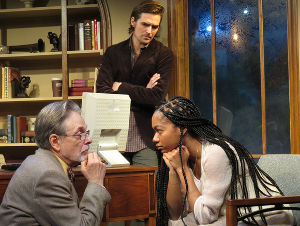|
& Juliet
Through June 4 at New Jersey Repertory, 179 Broadway, Long
Branch. Thurs. & Fri. at 8PM; Sat. at 3 & 8; Sun. at 2PM.
For tickets ($46): 732- 229-3166 or online at www.njrep.org
There is an intriguing one-act, 80-minute play on the
New Jersey Repertory stage. Unfolding in the fertile theatrical setting
of higher-education academia, it deals with faculty jealousy, conflicts
between established and fresh values, artistic integrity and racial
tension. It takes some digging, however, to excavate that play from
Robert Caisley’s 100-minute, two-act “& Juliet,”
which is burdened by those 20 extra minutes of repetitious dialogue.
“Get to it!” I wanted to call out several times as the
characters talked around the same topic over and over before finally
making their points.
Those points revolve around newly-hired Theatrical Department director
Charlie’s decision to pass over well-prepared African-American
female student Annie in favor of casting a 14-year old boy as Juliet
in the upcoming Shakespearian production. (Despite Gwyneth Paltrow’s
luminous turn in “Shakespeare in Love,” the original Juliet,
circa 1598, was Robert Goffe, who is not represented in Caisley’s
play.)
Charlie (Jacob A. Ware) is assuming the duties (and scenic-view corner
office) of 30-year veteran professor David (John Fitzgibbon), who
resents the newcomer on his own as well as Annie’s (Nadia Brown)
behalf. The elongated opening scene between the two men bristles with
the elder’s Thinly Veiled Hostility, which eludes busily unpacking
Charlie.
Ware fits the role of an idealistic teacher/director who would embrace
the ‘radical’ casting – even making it seem reasonable.
He plays some of Charlie’s confrontations with such high-volume
anger, however, that the actor has no room to build within the scenes.
That over-intensity drains some of the sympathy for Charlie, but we
still root for him – at least I did. Ware plays his gullible
innocence convincingly.
Director Marc Geller also loosened the reins with the other two actors.
We really, really get that Annie really, really wants to play Juliet.
In fairness to Ms. Brown’s charm and effectiveness in the few
more laid-back moments, there are only so many ways to declaim oft-repeated
and barely-paraphrased speeches. It is the playwright’s Annie
that finally grates, not the actress’s. And If Fitzgibbon strays
into over-acting, the fault may lie with the pompous Professor he’s
playing. It will be noted, however, that no one plays Thinly Veiled
Hostility better than Fitzgibbon. Between his David’s nasty
tinge and Charlie’s initial naïveté, the play couldn’t
end any way other than how it does. (No more about that.)
In fairness, it is, after all, the play’s first outing, affording
Caisley the opportunity to tighten it up. Less-is-more may be a cliché,
but not without reason. Cutting excess verbiage from “&
Juliet” will sharpen the characters and the story. “Let
me explain,” implores Charlie more than once. And then doesn’t.
Sheesh, let the man explain. (Don’t monkey with the set, though.
Another conquest over NJ Rep’s smallish stage by Jessica Parks:
would you believe…a turntable!)
|


